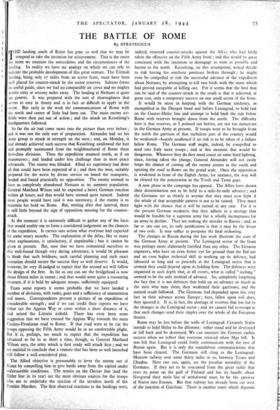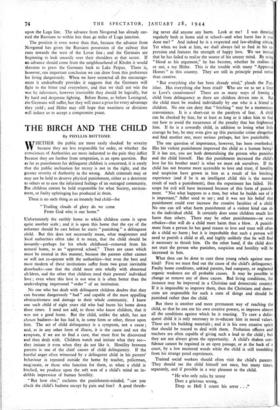THE BATTLE OF ROME
By STRATEGICUS
THE landing south of Rome has gone so well that we may be tempted to take the intention for achievement. This is the easier the more we examine the antecedents and the circumstances of the
landing. In reality we have no analogy on which we can rely to indicate the probable development of this great venture. The Termoli landing, being only x7 miles from an active front, must have been
well placed for counter-attack by the sector reserves. Salerno forms no useful guide, since we had no comparable air cover and no mighty armies sixty or seventy miles away. The landing at Nettuno is quite sui generis. It was prepared with _ the sort of thoroughness that seems so easy in theory and is in fact so difficult to apply in the event. But early in the week the communications of Rome with the north and centre of Italy had been cut. The main enemy air- fields were then put out of action ; and the attack on Kesselring's headquarters followed.
So far the air had come more into the picture than ever before ; and it was not the only sort of preparation. Alexander hid set his army group to attack in strength on the west ; and, on Monday, it had already achieved such success that Kesselring swallowed the bait and promptly summoned from the neighbourhood of Rome three
first-class divisions. Then the expedition steamed north, as if on manoeuvres ; and landed under less challenge than in most peace rehearsals. The enemy was blinded. Allied air supremacy, had done all that could have been expected of it ; and then the men, suitably prepared for the worst by divine service on board the transports, landed and found practically no opposition. The enemy seemed to have as, completely abandoned Nettuno as its summer population.
General Maitland Wilson said he expected a heavy German reaction within 48 hours, and that would have seemed quite natural. Indeed
most people would have said it was necessary, if the enemy is to maintain his hold on Rime. But, writing after that interval, there is still little beyond the sign of opposition massing for the counter- attack.
At tire moment it is extremely difficult to gather any of the facts that would enable one to form a considered judgement on the chances of the expedition. It carries into action what everyone had expected for some weary months. The explanation of the delay, like so many other explanations,. is satisfactory, if unpalatable ; but it cannot be
given at present. But, now that we have committed ourselves to
this well-found though very daring adventure, it would be pleasant to think that such boldness, such careful planning and such exact execution should secure the success they so well deserve. It would, however, be very ill-judged to expect that the second act will follow the design of the first. As far as one can see the bridgehead is now about fifteen miles in extent ; and that would seem quite a reassuring measure, if it is held by adequate troops, sufficiently equipped.
From some reports it seems probable that we have landed a number of divisions, with tanks, guns and a sufficiency of ammunition and stores. Correspondents present a picture of an expedition of considerable strength ; and if we can credit their reports we have either cut the Appian Way or come within a short distance of it, and seized the Littoria airfield. There has even been some suggestion that we have crossed the Appian Way towards the main Cassino-Frosinone road to Rome. If that road were to be cut the troops opposing the Fifth Army would be in no comfortable plight. But it is, perhaps, too much to expect that the expedition has advanced so far in so short a time, though, as General Maitland Wilson says, the army which is first ready will attack first ; and we are entitled to conclude that a venture that has been so well launched will follow a well-considered plan.
The Allied objective is presumably to lever the enemy out of Rome by compelling him to give battle away from the capital under unfavourable conditions. The armies on the Gustav line (and the Hitkr line in its rear) are the most obvious sources for the troops who art to undertake the ejection of the invaders north of the Pontine Marshes. The first observed reactions to the landings were,
indeed, renewed counter-attacks against the Allies who had lately taken the offensive on the Fifth Army front ; and this would be qti.te consistent with the intention to disengage as soon as possible and hasten to the north. Kesselring, on this assumption, would decide to risk having his southern positions broken through ; he might even be compelled to risk the successful advance of the expedition about Nettuno, by attempting to kill two birds with the stone which had proved incapable of killing one. For it seems that the best that can be said of the counter-attack in the south is that it achieved, at great cost, only a temporary success on one small sector of the front.
It would be more in keeping with the German tendency, as exemplified in the Dnieper bend and before Leningrad, to hold fast on the Gustav-Hitler line and attempt to hold back the tide below Rome with reserves brought down from the north. The difficulty here is that reserves, as I pointed out before, are not too numerous in the German Army at present. If troops were to be brought from the north the garrison of that turbulent part of the country would be weakened—heavily weakened if no risk is to be taken of a failure below Rome. The German staff might, indeed, be compelled to send into Italy more troops ; and at this moment that would be dangerous. Whatever they do they must count on some hard fighting, since, having taken the plunge, General Alexander will not easily forgo the chance of cutting off the enemy armies in the south and opening the road to Rome on the grand scale. Once the opposition is weakened in front of the Eighth Army, for instance, the way will be cleared for the penetration to the Tivoli and Terni gaps.
A new phase in the campaign has opened. The Allies have shown their determination not to be held to a mile-by-mile advance ; and the Germans see as clearly as anyone that they must now fight if the whole of that acceptable pattern is not to be ruined. They must fight with the chance that it will be ruined in any case. For it is the present German weakness that they adhere to a strategy that would be feasible for a supreme army but is wholly incongruous for an army in decline.. They are making the mistake in Russia ; and, as far as one can see, its only justification is that it may be the lesser of two evils. It may,suffice to postpone the final reckoning.
The changes in Russia during the last week illustrate the state of the German Army at present. The Leningrad sector of the front was perhaps more elaborately fortified than any other. The German engineers, who have an even better eye for ground than the Ital'ans and an even higher technical skill in working up its defence, had laboured so long and so patiently at the Leningrad sector that it seemed they could depend upon its holding firm. The defences were organised in such depth that, at all events, what is called " inching " seemed to be the only method of advance. So, completely forgetting the fact that it is not defences that hold up an advance so much as the men who man them, they weakened their garrisons; and the natural result followed. The Germans had depended upon this very fact in their advance across Europe ; here, fallen upon evil days, they ignored it. It is, in fact, the shortage of reserves that has led to the changes in the Leningrad sector ; and we cannot fail to recognise that such changes send their ripples over the whole of the European theatre.
Rome may be lost before the walls of Leningrad. Certainly Stalin intends to hold Hitler to the dilemma : either stand and be destroyed or fall back and be destroyed. We can measure the German earlier
success when we reflect that everyone rejoiced when Mga fell. It was felt that Leningrad could freely communicate with the rest of
Russia again. But it is only the roundabout communications that have been cleared. The Germans still cling to the Leningrad- Moscow railway over some thirty miles or so, between Tosno and Chudno. Here one can, again, see the peculiar mentality of the Germans. If they are to be evacuated from the great sickle that rests its point on the gulf of Finland and has its handle about Novgorod their main line of withdrawal must be by the gateWay
of Narva into Estonia. But that railway has already been cut west of the junction of Gatchina. There is another route which depends
upon the Luga line. The advance from Novgorod has already car- ried the Russians to within less than 40 miles of Luga junction.
The position is even worse than that, because the advance from Novgorod has given the Russians possession of the railway that runs towards the west of the Lovat line ; and the Germans are beginning to look uneasily over their shoulders at that sector. If an advance should come from the neighbourhood of Kholm it would threaten to press the Germans back to Lake Peipus. There is, however, one important conclusion we can draw from this preference for living dangerously. When we have extracted all the encourage- ment it undoubtedly provides it suggests that the Germans will fight to the bitter end everywhere, and that we shall not win the war by inferences, however irresistible they should be logically, but by hard and desperate fighting. Before Rome, as before Leningrad, the Germans will suffer, but they will exact a price for every advantage they yield ; and Hitler may still hope that weariness or divisions will induce us to accept a compromise peace.



























 Previous page
Previous page